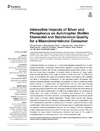Identificador persistente para citar o vincular este elemento:
https://accedacris.ulpgc.es/jspui/handle/10553/69921
| Título: | Interactive impacts of silver and phosphorus on autotrophic biofilm elemental and biochemical quality for a macroinvertebrate consumer | Autores/as: | Crenier, Clément Sanchez-Thirion, Kévin Bec, Alexandre Felten, Vincent Ferriol, Jessica González, Aridane G. Leflaive, Joséphine Perrière, Fanny Ten-Hage, Loïc Danger, Michael |
Clasificación UNESCO: | 230331 Química del agua 251002 Oceanografía química |
Palabras clave: | Benthic Microalgae Ecological Stoichiometry Essential Fatty Acids Freshwater Biofilms Gammarus Fossarum, et al. |
Fecha de publicación: | 2019 | Publicación seriada: | Frontiers in Microbiology | Resumen: | Autotrophic biofilms are complex and fundamental biological compartments of many aquatic ecosystems. In particular, these biofilms represent a major resource for many invertebrate consumers and the first ecological barrier against toxic metals. To date, very few studies have investigated the indirect effects of stressors on upper trophic levels through alterations of the quality of biofilms for their consumers. In a laboratory study, we investigated the single and combined effects of phosphorus (P) availability and silver, a re-emerging contaminant, on the elemental [carbon (C):nitrogen (N):P ratios] and biochemical (fatty acid profiles) compositions of a diatom-dominated biofilm initially collected in a shallow lake. We hypothesized that (1) P and silver, through the replacement of diatoms by more tolerant primary producer species, reduce the biochemical quality of biofilms for their consumers while (2) P enhances biofilm elemental quality and (3) silver contamination of biofilm has negative effects on consumers life history traits. The quality of biofilms for consumers was assessed for a common crustacean species, Gammarus fossarum, by measuring organisms' survival and growth rates during a 42-days feeding experiment. Results mainly showed that species replacement induced by both stressors affected biofilm fatty acid compositions, and that P immobilization permitted to achieve low C:P biofilms, whatever the level of silver contamination. Gammarids growth and survival rates were not significantly impacted by the ingestion of silver-contaminated resource. On the contrary, we found a significant positive relationship between the biofilm P-content and gammarids growth. This study underlines the large indirect consequences stressors could play on the quality of microbial biomass for consumers, and, in turn, on the whole food web. | URI: | https://accedacris.ulpgc.es/handle/10553/69921 | ISSN: | 1664-302X | DOI: | 10.3389/fmicb.2019.00732 | Fuente: | Frontiers in Microbiology [ISSN 1664-302X], v. 10, 732 |
| Colección: | Artículos |
Citas SCOPUSTM
11
actualizado el 08-jun-2025
Citas de WEB OF SCIENCETM
Citations
10
actualizado el 22-feb-2026
Visitas
60
actualizado el 10-ene-2026
Descargas
69
actualizado el 10-ene-2026
Google ScholarTM
Verifica
Altmetric
Comparte
Exporta metadatos
Los elementos en ULPGC accedaCRIS están protegidos por derechos de autor con todos los derechos reservados, a menos que se indique lo contrario.
